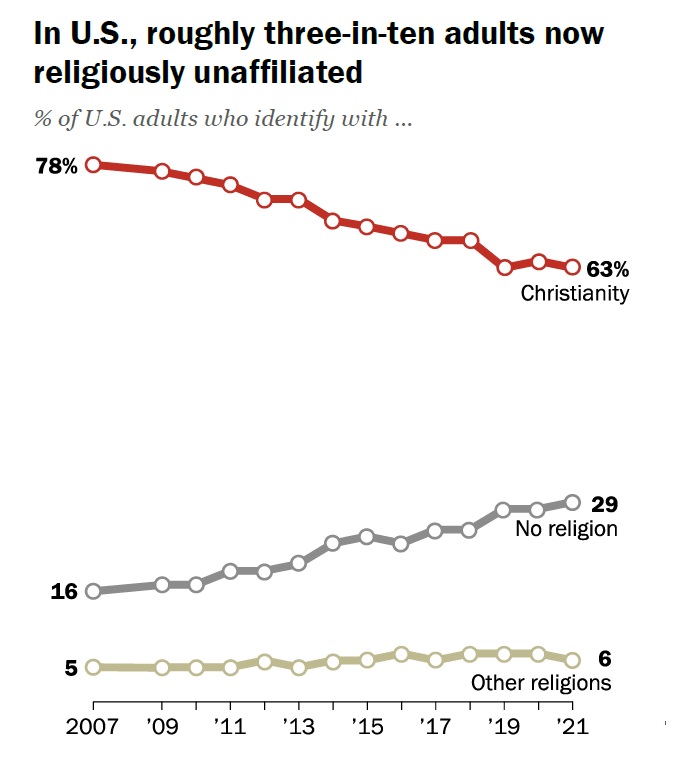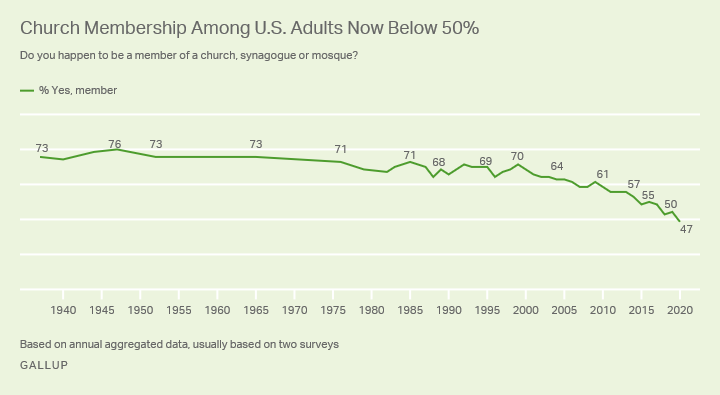TWH – The number of Christians appears to be decreasing according to data released last week by the Pew Research Center. The overall percentage of people in the U.S. who identify as Christians has decreased over the past 10 years while the percentage of religiously unaffiliated individuals has steadily risen.

Many candles in a darkened space [Pixabay]
The research employed a random sample of responses based on U.S. addresses and respondents were contacted by phone. The data were collected by the Pew Research Center’s 2020 and 2021 National Public Opinion Reference Surveys between late May and August of this year.
To calculate changes from a decade ago, the Center used previously collected data.
The 2021 survey instrument focused on specific religious and denomination choices that did not include and Pagan or Native American Faiths.
The responses allowed were Protestant (for example, Baptist, Methodist, Non-denominational, Lutheran, Presbyterian, Pentecostal, Episcopalian, Reformed, Church of Christ, etc.), Roman Catholic, Mormon/LDS, Christian Orthodox, Jewish, Muslim, Buddhist, Hindu, Atheist, or Agnostic followed by “something else” and “Nothing in particular.”

Source: Pew Research Center’s National Public Opinion Reference Surveys (NPORS), conducted online and by mail among a nationally representative group of U.S. adults recruited using address-based sampling. “About Three-in-Ten U.S. Adults Are Now Religiously Unaffiliated”
Respondents choosing “something else” were asked to specify. Coders were instructed to alter responses based on a participant’s endorsement of “Do you think of yourself as a Christian or not?” Coders were told to select “No” if the respondent names a non-Christian religion, “e.g. Native American, Wiccan, Pagan, etc.” This is the only time that Wiccan or Pagan is mentioned in the Center’s guidance on this report.
The Center reports that 75% of individuals living in the United States identified as Christian in 2011. However, in 2021, that number went down to 63% representing a 12% decrease. The Center’s report notes “Christians continue to make up a majority of the U.S. populace, but their share of the adult population is 12 points lower in 2021 than it was in 2011. In addition, the share of U.S. adults who say they pray on a daily basis has been trending downward, as has the share who say religion is “very important” in their lives.”
Over the past 10 years, disinterest in organized religion has also grown. Earlier this year in March, Gallup released a poll showing that U.S. church membership had fallen below 50% since the organization began collecting such data 80 years ago.
Gallup added that their data suggest the “decline in church membership is primarily a function of the increasing number of Americans who express no religious preference.” Their data shows what they described as a near “perfect alignment between not having a religious preference and not belonging to a church.” They noted that there appears to be a growing number of individuals in the U.S. population who do not endorse any religion.
Gallup also noted a generational trend. Adults in the sample born before 1946 had the highest church membership with 66%. The numbers then dropped generationally, with church attendance dropping to 58% among baby boomers, 50% for those in Generation X, and 36% among millennials. Gallup said that members of Gen Z who have reached adulthood to be able to participate in the study were reporting church attendance rates similar to millennials.
The Pew Center observed a similar pattern. Their data found that “about three-in-ten U.S. adults (29%) are religious “nones” – people who describe themselves as atheists, agnostics or “nothing in particular” when asked about their religious identity.” To place the decline in context, in the 2007 surveys, the number of Christians was almost five times larger than the “nones” (78% vs. 16%).

“U.S. church membership was 73% when Gallup first measured it in 1937 and remained near 70% for the next six decades, before beginning a steady decline around the turn of the 21st century.” Source: Gallup
The declines in Christianity were most precipitous among Protestant denominations, dropping from 52% in 2007 to 40% in 2021. Roman Catholics have leveled off at about 21% of the adult U.S. population. However, born-again or evangelical Protestants continue to outnumber other Protestant denominations.
The pattern exists in both Black and white populations surveyed.
Pew Center cautioned that the long-term trend remains unclear when looking at the subgroup of respondents who said that religion is “very important” in their lives. However, the number of individuals who endorsed that religion is “not too” or “not at all” important more than doubled since 2007 from 16% then to 33% in 2021.
Still another research team, the nonpartisan Public Religion Research Institute, released their report last summer. In their 2020 American Values Atlas, PRRI found that “seven in ten Americans (70%) identify as Christian, including more than four in ten who identify as white Christian and more than one-quarter who identify as Christian of color. Nearly one in four Americans (23%) are religiously unaffiliated, and 5% identify with non-Christian religions.”
PRRI found similar trends with “nones” noting that “Disaffiliating white Christians have fueled the growth of the religiously unaffiliated” but that the trend has slowed. Their data suggest that the proportional changes across survey administrations show the trend but with fewer individuals identifying as “nones” each time. They also observed the generational divides
PRRI also found that the pace of abandonment of Christianity had slowed among white Christians. PRRI wrote the “proportion of white Christians hit a low point in 2018, at 42%, and rebounded slightly in 2019 and 2020, to 44%. That tick upward indicates the decline is slowing from its pace of losing roughly 11% per decade.”
With the exception of Hinduism, all three surveys focus their attention on the traditional monotheistic models of organized religion common in US culture. Neo-Paganism, polytheism, nor any of its religions were included in the surveys. Neither were Native American faiths, folk religions, or African Traditional Religions. But it is important to note that the findings showed trends away from Christianity without attention to what faiths survey respondents might be turning to.
Furthermore, whether these trends represent a continuing secularization of America remains unclear. By all accounts and including research findings, the US remains a vigorously religious nation. Religion’s place in public life remains stronger, perhaps stronger than ever.
The Wild Hunt is not responsible for links to external content.
To join a conversation on this post:
Visit our The Wild Hunt subreddit! Point your favorite browser to https://www.reddit.com/r/The_Wild_Hunt_News/, then click “JOIN”. Make sure to click the bell, too, to be notified of new articles posted to our subreddit.